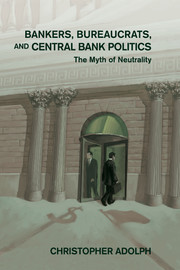Book contents
- Frontmatter
- Contents
- List of figures
- List of tables
- List of boxes
- Abbreviations
- Acknowledgements
- 1 Agents, institutions, and the political economy of performance
- 2 Career theories of monetary policy
- 3 Central banker careers and inflation in industrial democracies
- 4 Careers and the monetary policy process: Three mechanism tests
- 5 Careers and inflation in developing countries
- 6 How central bankers use their independence
- 7 Partisan governments, labor unions, and monetary policy
- 8 The politics of central banker appointment
- 9 The politics of central banker tenure
- 10 Conclusion: The dilemma of discretion
- References and Author index
- Subject index
- About the type, figures, and data
- Other Books in the Series
2 - Career theories of monetary policy
Published online by Cambridge University Press: 05 April 2013
- Frontmatter
- Contents
- List of figures
- List of tables
- List of boxes
- Abbreviations
- Acknowledgements
- 1 Agents, institutions, and the political economy of performance
- 2 Career theories of monetary policy
- 3 Central banker careers and inflation in industrial democracies
- 4 Careers and the monetary policy process: Three mechanism tests
- 5 Careers and inflation in developing countries
- 6 How central bankers use their independence
- 7 Partisan governments, labor unions, and monetary policy
- 8 The politics of central banker appointment
- 9 The politics of central banker tenure
- 10 Conclusion: The dilemma of discretion
- References and Author index
- Subject index
- About the type, figures, and data
- Other Books in the Series
Summary
Where you stand depends on where you sit.
RUFUS E. MILES, JR.WHEN THE ECONOMY begins to stall, central bankers must decide when to turn from inflation fighting to demand management. Recent global downturns have lasted longer than those of the mid-twentieth century, suggesting central banks have been too conservative, prioritizing phantom inflation fears in the face of global recession or even deflation. The dilemma of inflation-prevention versus recession-fighting raises questions not only about the balance between central bank's independence and their accountability to the public, but also about the beliefs and interests of people working within them. Which kinds of central bankers are conservative, and which are not?
Unfortunately, the political economy literature remains ill-positioned to address this question because scholars normally conflate central bank conservatism and central bank independence. This confusion of preferences and institutions arises from the unsupported assumptions that independent central bankers are naturally conservative and that government meddling is the only source of loose monetary policy. Rather than ground a large and influential literature in untested assumptions, we should disentangle our understanding of monetary preferences and institutions. To succeed, we need a theory and measure of central bank conservatism to complement existing work on central bank independence.
Understanding central bankers' monetary policy preferences begins with central bankers' career paths and career concerns. A central banker's career background may influence his personal beliefs about the ideal tradeoff between in flation and output stability, while at the same time providing the basis for an exchange: future careers for the central banker; policy influence for the shadow principal providing the central banker's next job.
- Type
- Chapter
- Information
- Bankers, Bureaucrats, and Central Bank PoliticsThe Myth of Neutrality, pp. 27 - 69Publisher: Cambridge University PressPrint publication year: 2013

